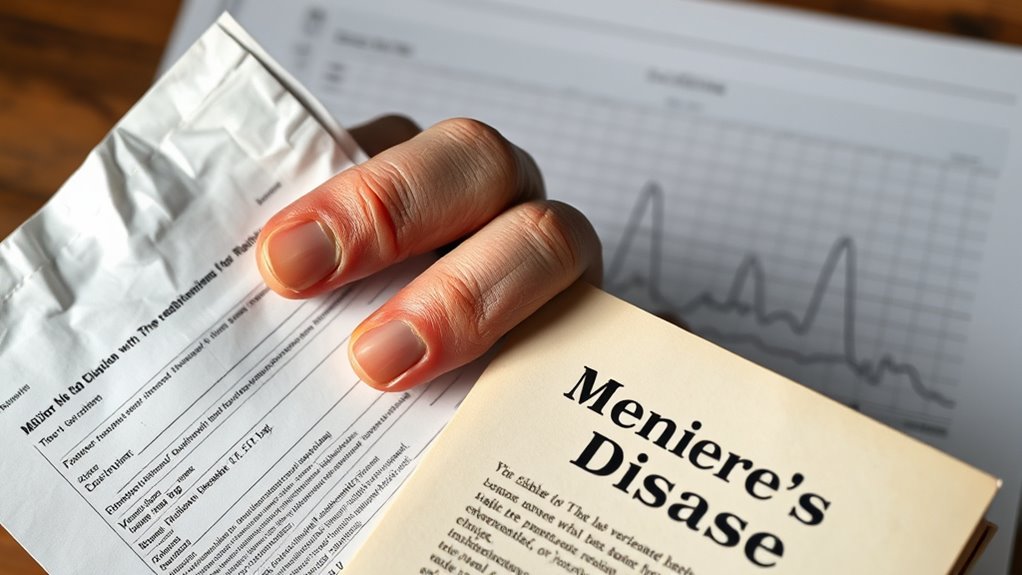To support your VA disability claim for Meniere’s Disease, it’s essential to include detailed medical evidence and vestibular assessments that document how your condition impacts your daily life and balance. These tests can objectively show your vertigo, hearing loss, and balance issues, helping establish the severity of your symptoms. Thorough documentation can increase your chances of obtaining a higher rating. For more strategies on strengthening your claim, keep exploring how VA evaluates these conditions.
Key Takeaways
- Vestibular assessments provide objective evidence of Meniere’s impact, supporting VA claims for disability benefits.
- Detailed medical reports documenting symptoms like vertigo and hearing loss strengthen the connection to service.
- Vestibular testing results can help establish the severity of impairment, potentially increasing disability ratings.
- Comprehensive documentation of how Meniere’s affects daily life and employment improves claim accuracy.
- Proactively undergoing specialized testing and maintaining thorough records enhance chances of receiving appropriate VA compensation.

Are you wondering how Meniere’s Disease might impact your VA disability benefits? If you’re dealing with this condition, understanding how it’s evaluated and documented is vital for securing the disability compensation you deserve. One key step in the process is a vestibular assessment, which plays a significant role in establishing the severity of your symptoms and how they affect your daily life. The VA relies heavily on medical evidence, including specialized assessments like vestibular testing, to determine the extent of service-connected disabilities. During a vestibular assessment, your healthcare provider evaluates your balance, dizziness, and vertigo episodes, providing objective data that can support your claim. This assessment helps clarify how much your condition impairs your ability to work and perform routine activities, directly influencing the level of disability compensation you’re awarded.
A vestibular assessment is crucial for documenting Meniere’s impact on daily life and VA disability claims.
When you file a claim, the VA will review your medical records and any supporting evidence, including results from vestibular assessments. These tests are essential because they quantify your symptoms and establish their impact on your functional capacity. A detailed evaluation can reveal how your Meniere’s Disease affects your equilibrium, hearing, and overall quality of life, all of which are important factors in VA disability ratings. If the assessment shows significant impairment, it can strengthen your case and potentially lead to a higher disability rating, meaning more compensation. Additionally, utilizing specialized assessments like vestibular testing can help differentiate Meniere’s symptoms from other conditions, making your claim more robust.
It’s important to understand that the VA’s process isn’t just about diagnosis; it’s about demonstrating how your condition limits your everyday functioning. Your medical provider’s detailed report from a vestibular assessment can be pivotal in this. Make sure you communicate all symptoms, including vertigo attacks, hearing loss, tinnitus, and balance issues, and ensure your healthcare provider highlights how these symptoms interfere with your ability to work or perform daily tasks. This documentation helps the VA accurately evaluate your disability and guarantees your compensation reflects your needs.
Ultimately, the goal is to establish a clear link between your service and your Meniere’s Disease, supported by thorough medical evidence. By undergoing a proper vestibular assessment and compiling detailed medical records, you enhance your chances of receiving appropriate disability compensation. Remember, the VA’s decision hinges on evidence, so proactive steps—like getting comprehensive testing—are essential to securing the benefits you’re entitled to and improving your quality of life despite the challenges of Meniere’s Disease.
Frequently Asked Questions
Can Meniere’s Disease Qualify for VA Disability Compensation?
Yes, you can qualify for VA disability compensation if you have Meniere’s Disease. The VA considers hearing loss and vestibular symptoms like vertigo as service-connected disabilities. If your condition is linked to your military service, you may be eligible for compensation. Make sure to provide medical evidence showing how your hearing loss and vestibular symptoms impact your daily life to strengthen your claim.
What Evidence Is Needed to Support Meniere’s Disease Claims?
Over 10 million Americans suffer from balance disorders, highlighting the importance of strong evidence. To support your claim, you need solid medical documentation showing your diagnosis and its impact. Expert testimony from your healthcare providers can strengthen your case by explaining how Meniere’s affects you. Collect detailed medical records, audiograms, and doctor statements to prove the severity and connection to your service, increasing your chances of approval.
How Does Meniere’s Disease Affect VA Disability Ratings?
Meniere’s Disease can markedly impact your VA disability rating due to tinnitus and balance issues. If your condition causes persistent tinnitus or frequent vertigo, it may increase your disability percentage. The VA assesses how these symptoms interfere with your daily life and ability to work. Providing medical evidence of balance issues and tinnitus impact helps support your claim, potentially leading to a higher disability rating based on the severity of your symptoms.
Are There Special Considerations for Service-Connected Meniere’s Disease?
Yes, there are special considerations for service-connected Meniere’s Disease. You should verify your condition is properly documented as service-connected, which can impact your VA disability rating. Additionally, the VA may consider the frequency and severity of vertigo episodes, hearing loss, and balance issues when evaluating your claim. Providing thorough medical evidence and detailed symptom descriptions can help support a higher disability rating and address any unique circumstances related to your condition.
How Long Does It Take to Process a VA Disability Claim for Meniere’s?
You might wonder how long it takes to process your VA disability claim for Meniere’s. Typically, it ranges from a few months to over a year, depending on factors like medical examinations and the appeal process. If your claim is complex or requires additional documentation, it could take longer. Staying proactive and providing thorough medical evidence can help speed things up, but patience is essential as your claim moves through review stages.
Conclusion
Navigating VA disability for Meniere’s disease can feel overwhelming, but knowing your rights helps. Did you know that approximately 1 in 1,000 people will develop Meniere’s at some point? Understanding how to document your symptoms and work with the VA can make a difference in securing the benefits you deserve. Stay informed, advocate for yourself, and remember you’re not alone in this journey toward managing your health and receiving proper support.










